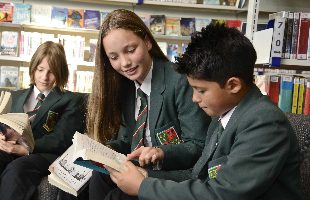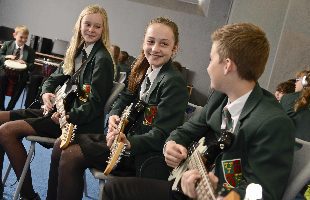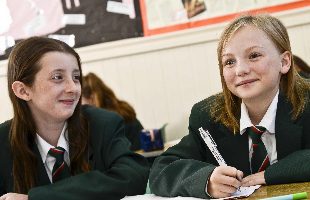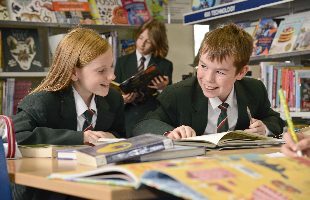Lifeskills
Year 7
RE: These schemes are intended to act as an introduction to RE at KKS. Different aspects of religious life from the six main world religions will be covered and aspects of these will be considered in further detail throughout KS3.
Citizenship: Human rights are part of a child’s everyday life and schools have a responsibility to enable children to make sense of the world around them. Knowing about rights and responsibilities, understanding what they are, and learning how they have been struggled for and sustained are important elements in the preparation of all young people for a life in a democratic and pluralistic society. Linked to this the justice system is one of the cornerstones of citizenship education and an understanding of the law and how it works is fundamental to playing an active role in society.
PSHE: PSHE education provides a framework through which key skills, attributes and knowledge can be developed and applied to some of the most pressing issues facing young people today: from mental health to understanding the importance of staying safe online.
| Autumn Term 1 World Religions | Autumn Term 2 Identity and Rights | Spring Half Term 3 Buddhism | Spring Half Term 4 The Law | Summer Term 5 Islam | Summer Term 6 PSHE | |
|---|---|---|---|---|---|---|
| Curriculum Knowledge | Facts, beliefs and traditions Religious symbols Religious leaders Places of worship Pilgrimage | Positive relationships Bullying and cyberbullying Prejudice and discrimination What are human rights? How do human rights work? | Buddha’s early life The four sights The four noble truths The eightfold path Meditation The life of a monk | What are laws? The jury system and crown court Criminal responsibility Magistrates’ court | Common beliefs in Christianity, Islam and Judaism The soul The Five Pillars of Islam Hajj Inside a mosque Islamic dress | Staying safe Personal hygiene Puberty Healthy and Unhealthy relationships Introducing consent |
| Subject Skills | Identify key features of religious beliefs and practices and begin to recognise the impact religion has on people’s lives | Developing a greater understanding of the world we live in and why this is not always fair | Describe the key features of religious beliefs and practices and explain the impact religion has on people’s lives. | Develop a sound knowledge and understanding of the role of law and the justice system in our society and how laws are shaped and enforced | Describe the key features of religious beliefs and practices and explain the impact religion has on people’s lives. | Know how to deal with changing situations in their personal and social development |
| How can you help your child engage with the content? | Visits to places of worship (can also be done online) Discuss your own beliefs and values and encourage your child to do the same Discuss the traditions your own family has or any places that have significance to your family | Read a copy of the Universal Declaration of Human Rights together Find out more about an activist e.g. Malala, Rosa Parks Discuss relevant issues in the news | Visit Conishead Priory in Ulverston Take a virtual tour of a Buddhist Temple Try some meditation, maybe using Headspace on Netflix | Discuss relevant news stories | Visit a mosque or take a virtual tour Find a video to watch together about the Hajj or Ramadan Watch Being Muslim on BBC IPlayer | Parents can help their child by making time to discuss what they are learning, allowing their child to take a lead in what they need more information about |
| Curriculum Opportunities | Interfaith DayVisits | Black History Month LGBT History Month Fairtrade fortnight Politics Club Schools diversity week | Interfaith DayVisits | Mock trial trip | Interfaith DayVisits |
Career Links
Lifeskills lessons allow students to develop a variety of valuable and transferable skills which pave the way to a wide variety of different careers paths or areas of further study. Some examples include: Broadcasting, Civil Service, Diplomatic Service, Education, Media, Journalism, Law, Police, Politics, Publishing, Research, Social Work.
Year 8
RE: Students will look at some complex religious and philosophical ideas this year and will explore their own beliefs and those of others.
Citizenship: An education in government and politics is fundamental to developing engaged and aware young adults who can take their place and play a role within the society in which they live.
PSHE: Young people increasingly face a range of pressures and often have to deal with situations that older people have never encountered. This scheme aims to give students the confidence to make the best decisions and to know where to access help and support when necessary.
| Autumn Term 1 Philosophy | Autumn Term 2 PSHE Health | Autumn Term 3 Politics | Spring Term 2 Life after Death | Spring Term 2 Life after Death | Spring Term 3 Real Game | Summer Term 1 Buddhist Beliefs | Summer Term 2 Money | Summer Term 3 Careers | |
|---|---|---|---|---|---|---|---|---|---|
| Curriculum content | Plato’s cave Creation and origins Stewardship The design argument The cosomological argument The problem of evil Darwin and evolution | Dental health Smoking Alcohol Attitudes towards mental health Promoting emotional wellbeing Conflict Violence and the law Managing heated situations | Monarchy Parliament Government Elections Create your own political party | Gambling Forced marriage Relationships Ending relationships Consent CSE and grooming Homophobia Parenting Public street harassment | Ghosts Near Death Experiences Christian views Hindu views Buddhist views | Different jobs and careers Planning a budget Leisure time Planning a holiday The Equality Act 2010 Careers research | The Three Universal Truths The Four Noble Truths The death of Buddha and the development of Buddhism Applying Buddhist teachings Meditation and koans | What’s it worth? Credit and debt Making ethical financial decisions Personal budgets | Job adverts Enterprising skills Enterprising personalities |
| Key Skills | Reflect on own beliefs (religious or otherwise) and perspective on lifeknowledge of, and respect for, different people’s faiths, feelings and values | The aim of teaching pupils about physical health and mental wellbeing is to give them the information that they need to make good decisions about their own health and wellbeing | Develop the knowledge which will give students the confidence to participate politically and make informed decisions | RSE should support learners to develop the knowledge, skills and values to understand how relationships shape their own lives and the lives of others | Weigh up evidence in order to formulate their own opinions and debate with others who may have differing views | Increase motivation by linking activities in school with preparation for life post 16 and post 18 | Explain in depth the diversity within different religions and begin to analyse different beliefs and lifestyles | Develop the skills needed to make the most of their money, plan for the future and avoid getting into problem debt or experiencing financial exploitation | Being enterprising, is about having a positive and resilient mindset and a healthy attitude towards trying new things |
| How can you engage with your child? | Watch a documentary about the big bang or evolutionShare views on some of the big issues such as why people sufferWatch The Truman Show for a modern retelling of Plato’s cave | Parents can help their child by making time to discuss what they are learning, allowing their child to take a lead in what they need more information about | Discuss issues in the newsWatch Prime Minister’s QuestionsTweet or email your MP or a government minister together about an important issueWatch some Ros Atkins explainers on BBC IPlayer | Parents can help their child by making time to discuss what they are learning, allowing their child to take a lead in what they need more information about | Discuss ideas about life after death togetherWatch the ‘Being’ series on BBC IPlayer which documents key events, including death rites, in some of main world religions. | Discuss your own work history, maybe involve older relatives too and talk about what work used to be likeUse the National Careers Service website and research some careers | Visit Conishead Priory in UlverstonTake a virtual tour of a Buddhist TempleTry some meditation, maybe using Headspace on Netflix | Create a budget togetherWatch some episodes of Money Explained on NetflixWatch Martin Lewis Money Saving Expert | Watch The Apprentice or Dragon’s DenTry some growth mindset activities togetherHave a game of Monopoly |
| Curriculum Opportunities | Politics Club | Smashed workshop | Politics ClubVisit from Tim Farron | Schools diversity weekLGBT History Month | Careers talks | Visit |
Career Links
Lifeskills lessons allow students to develop a variety of valuable and transferable skills which pave the way to a wide variety of different careers paths or areas of further study. Some examples include: Broadcasting, Civil Service, Diplomatic Service, Education, Media, Journalism, Law, Police, Politics, Publishing, Research, Social Work.
Year 9
RE – Schemes in Year 9 encourage students to look critically at a range of issues and to develop and discuss their own views as well as discussing different religious views on these.
Citizenship – One goal of education is preparing young people to be better citizens. It’s simply dangerous to pretend that understanding the law is intuitive. Understanding of the law can help young people protect themselves and prevent many crimes from taking place. Teaching young people about the law gives them much more than a bedrock of legal facts; it provides a tool for self-advocacy and a shield against abuse.
PSHE – PSHE education gives students the knowledge, skills, and attributes they need to keep themselves healthy and safe. PSHE education helps pupils to achieve their academic potential, and leave school equipped with skills they will need throughout later life.
| Autumn Term Ethics | Spring Term 1 PSHE – RSE | Spring Term 2 Do we need religion? | Summer Term 1 PSHE – Health | Summer Term 2 Careers | Summer Term 3 Crime and Punishment | |
|---|---|---|---|---|---|---|
| Curriculum content | Ideas about right and wrong Animal ethics Euthanasia Abortion Sex and relationships Wealth Humanist views Christian responses to ethical issues | Starting relationships Abuse within relationships Consent Preventing STIs Contraception Exploitation Staying safe Issues with pornography and sexting Sending selfies | Atheism Humanism Does religion cause terrorism? Cults and sects v religion Quakers Pagans | Sleep Drugs and alcohol – exploring attitudes Smoking Alcohol Managing risk Cannabis County lines Knife crime Healthy coping strategies Gender-based violence | Progression pathways START careers programme University life Careers research | Why do people commit crimes? Aims of punishment Types of punishment The justice system Miscarriages of justice Religious views on crime and punishment The prison system Capital punishment |
| Key Skills | Develop their understanding and awareness of spiritual, moral, social and cultural issues They are able to weigh up evidence in order to formulate their own opinions and debate with others who may have differing views | RSE should support learners to develop the knowledge, skills and values to understand how relationships shape their own lives and the lives of others | Students are given the opportunity to look critically at a range of issues and to develop and discuss their own views on these | The aim of teaching pupils about physical health and mental wellbeing is to give them the information that they need to make good decisions about their own health and wellbeing | Look critically at the job market, assess opportunities and make well-informed choices, providing knowledge about work and about future study and training routes | They are able to weigh up evidence in order to formulate their own opinions and debate with others who may have differing views. They are able to back up claims and personal beliefs effectively whilst considering the counter-arguments posed. |
| How can you engage with your child? | Discuss the arguments for and against some of these ethical issues Watch some Ros Atkins explainers on BBC IPlayer (e.g. there is one about the abortion debate in the USA) | Parents can help their child by making time to discuss what they are learning, allowing their child to take a lead in what they need more information about | Watch the cults documentary on the Explained series on Netflix Visit the Quaker Tapestry Take the opportunity to have a good discussion about these topics | Parents can help their child by making time to discuss what they are learning, allowing their child to take a lead in what they need more information about | Discuss your own work history, maybe involve older relatives too and talk about what work used to be like Use the National Careers Service website and research some careers | An ideal opportunity to listen to a true crime podcast or watch a documentary such as one from the Life and Death Row series on BBC IPlayer Have a debate about the death penalty |
| Curriculum Opportunities | Politics Club | Careers interviews Careers talks |
Career Links
Lifeskills lessons allow students to develop a variety of valuable and transferable skills which pave the way to a wide variety of different careers paths or areas of further study. Some examples include: Broadcasting, Civil Service, Diplomatic Service, Education, Media, Journalism, Law, Police, Politics, Publishing, Research, Social Work.






